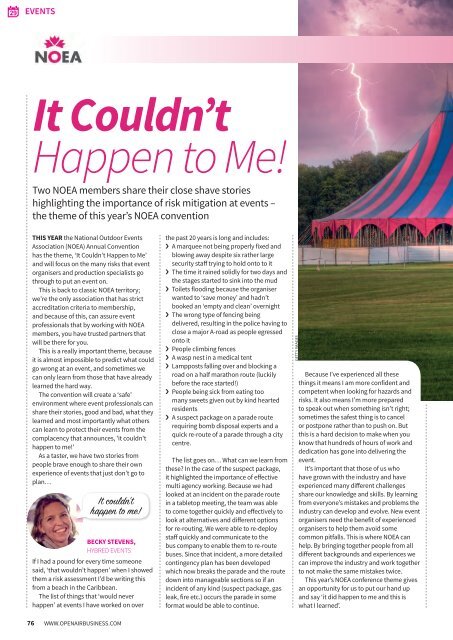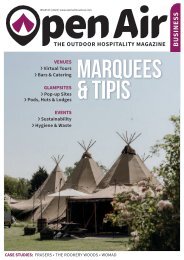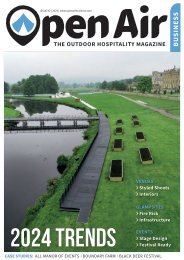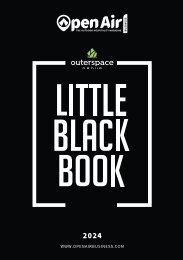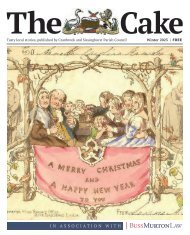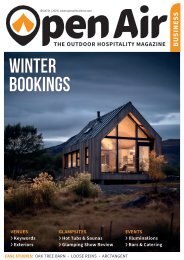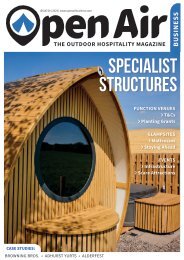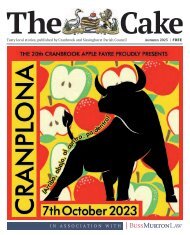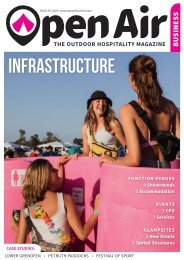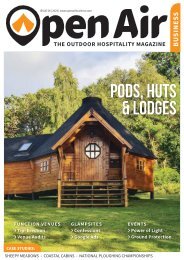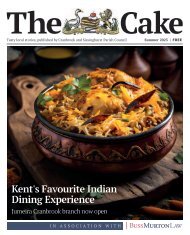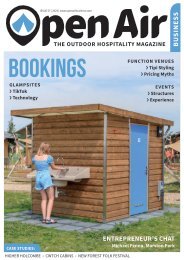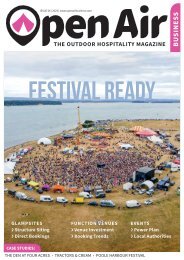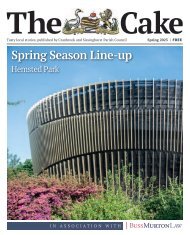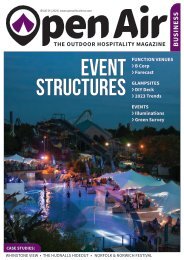Open Air Business October/November 2018
The UK's outdoor hospitality business magazine for function venues, glamping, festivals and outdoor events
The UK's outdoor hospitality business magazine for function venues, glamping, festivals and outdoor events
Create successful ePaper yourself
Turn your PDF publications into a flip-book with our unique Google optimized e-Paper software.
EVENTS<br />
It Couldn’t<br />
Happen to Me!<br />
Two NOEA members share their close shave stories<br />
highlighting the importance of risk mitigation at events –<br />
the theme of this year’s NOEA convention<br />
THIS YEAR the National Outdoor Events<br />
Association (NOEA) Annual Convention<br />
has the theme, ‘It Couldn’t Happen to Me’<br />
and will focus on the many risks that event<br />
organisers and production specialists go<br />
through to put an event on.<br />
This is back to classic NOEA territory;<br />
we’re the only association that has strict<br />
accreditation criteria to membership,<br />
and because of this, can assure event<br />
professionals that by working with NOEA<br />
members, you have trusted partners that<br />
will be there for you.<br />
This is a really important theme, because<br />
it is almost impossible to predict what could<br />
go wrong at an event, and sometimes we<br />
can only learn from those that have already<br />
learned the hard way.<br />
The convention will create a ‘safe’<br />
environment where event professionals can<br />
share their stories, good and bad, what they<br />
learned and most importantly what others<br />
can learn to protect their events from the<br />
complacency that announces, 'it couldn't<br />
happen to me!'<br />
As a taster, we have two stories from<br />
people brave enough to share their own<br />
experience of events that just don’t go to<br />
plan…<br />
It couldn't<br />
happen to me!<br />
BECKY STEVENS,<br />
HYBRED EVENTS<br />
If I had a pound for every time someone<br />
said, ‘that wouldn’t happen’ when I showed<br />
them a risk assessment I’d be writing this<br />
from a beach in the Caribbean.<br />
The list of things that ‘would never<br />
happen’ at events I have worked on over<br />
the past 20 years is long and includes:<br />
› A marquee not being properly fixed and<br />
blowing away despite six rather large<br />
security staff trying to hold onto to it<br />
› The time it rained solidly for two days and<br />
the stages started to sink into the mud<br />
› Toilets flooding because the organiser<br />
wanted to ‘save money’ and hadn’t<br />
booked an ‘empty and clean’ overnight<br />
› The wrong type of fencing being<br />
delivered, resulting in the police having to<br />
close a major A-road as people egressed<br />
onto it<br />
› People climbing fences<br />
› A wasp nest in a medical tent<br />
› Lampposts falling over and blocking a<br />
road on a half marathon route (luckily<br />
before the race started!)<br />
› People being sick from eating too<br />
many sweets given out by kind hearted<br />
residents<br />
› A suspect package on a parade route<br />
requiring bomb disposal experts and a<br />
quick re-route of a parade through a city<br />
centre.<br />
The list goes on… What can we learn from<br />
these? In the case of the suspect package,<br />
it highlighted the importance of effective<br />
multi agency working. Because we had<br />
looked at an incident on the parade route<br />
in a tabletop meeting, the team was able<br />
to come together quickly and effectively to<br />
look at alternatives and different options<br />
for re-routing. We were able to re-deploy<br />
staff quickly and communicate to the<br />
bus company to enable them to re-route<br />
buses. Since that incident, a more detailed<br />
contingency plan has been developed<br />
which now breaks the parade and the route<br />
down into manageable sections so if an<br />
incident of any kind (suspect package, gas<br />
leak, fire etc.) occurs the parade in some<br />
format would be able to continue.<br />
GETTY IMAGES<br />
Because I’ve experienced all these<br />
things it means I am more confident and<br />
competent when looking for hazards and<br />
risks. It also means I’m more prepared<br />
to speak out when something isn’t right;<br />
sometimes the safest thing is to cancel<br />
or postpone rather than to push on. But<br />
this is a hard decision to make when you<br />
know that hundreds of hours of work and<br />
dedication has gone into delivering the<br />
event.<br />
It’s important that those of us who<br />
have grown with the industry and have<br />
experienced many different challenges<br />
share our knowledge and skills. By learning<br />
from everyone’s mistakes and problems the<br />
industry can develop and evolve. New event<br />
organisers need the benefit of experienced<br />
organisers to help them avoid some<br />
common pitfalls. This is where NOEA can<br />
help. By bringing together people from all<br />
different backgrounds and experiences we<br />
can improve the industry and work together<br />
to not make the same mistakes twice.<br />
This year’s NOEA conference theme gives<br />
an opportunity for us to put our hand up<br />
and say ‘it did happen to me and this is<br />
what I learned’.<br />
76 WWW.OPENAIRBUSINESS.COM


